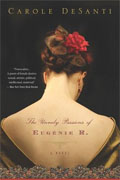The Unruly Passions of Eugenie R.
Carole DeSanti
book reviews:
· general fiction
· chick lit/romance
· sci-fi/fantasy
· graphic novels
· nonfiction
· audio books
· author interviews
· children's books @
curledupkids.com
· DVD reviews @
curledupdvd.com
newsletter
win books
buy online
links
home
for authors
& publishers
for reviewers

 |
The Unruly Passions of Eugenie R. Carole DeSanti Mariner Books Paperback 432 pages March 2013 |
|
Click here to read reviewer Luan Gaines' take on The Unruly Passions of Eugenie R. DeSanti fills the pages of her dense novel with vibrant intensity and decadence. The author tracks the life of Eugenie Rigault, “a goose-girl” from a tiny village hugging the Pyrenees, as she moves through the pampered halls of Paris aristocracy to the city's bawdy brothels and crime-riddled back alleys, where theft and deceit thrive.
DeSanti establishes her story as a series of set pieces, with each chapter capturing nights and days in the life of hedonistic Paris. An intricate web of law and social relations spreads out over the capital “like a giant net." Great crowds point and chatter on every corner, making oblique references to “the Code Civil”--the dangerous moral law that restricts the activities of the city’s prostitutes. With no word from Stephan ("my erstwhile lover would not alight from a cab"), desperate Eugenie models for artist Pierre Chasseloup. Becoming a full-time grisette, she finds herself through Chasseloup's connections a denizen of Parisian café life, where “competition is commerce and winning is work.” In Eugenie’s Paris, corruption and exploitation are endemic, from the odiously selfish men in positions of power to the needs of Eugene’s best friend, the beautiful Jolie, who proves to be contemptuous of nearly everyone--especially the concupiscent old fools who squander their wealth and health on attempting to bind her to them. Jolie’s carnal magnetism lushly dominates men of every rank and age, though her own willful whimsies and compulsions repeatedly interfere with her murky self-interest. Eugenie’s battle is as vast as the reach of Napoleon’s Second Empire; the depraved dictator and the courtesan embody everything corrupt about society. Shepherding fear, desire, doubt, and chaos, Eugenie and Jolie are shut behind padlocked doors, cloaked off by officious Nathalie Jouffroy. Running the most selective brothel in Paris, Natalie’s clients are men of government, business and industry, "Lords of the realms of lace and ribbon.” Ensconced in Salon Deux, “glittering like a velvet-festooned sparkling cave,” world-weary Eugenie seeps back into a sepia-toned landscape like “a carte de visite,” even as her compatriots remain as hard-edged as ever. Seething with moral censure, DeSanti’s book reflects the indictment of those who seek to limit individuals whose follies and “sins” are seen as incongruent to the society through which they move. As bad luck swamps Eugenie, she stands evermore at the mercy of the Morals Brigade. Yet her defiance and careless courage under impossible conditions are not so much a true acknowledgment of her situation, but partly her inability to accept it and to plan for it. From her rise to the cynosure of the Parisian demi-monde to the gutter (where she finds herself with child) then back again to the salons, Eugenie’s battle to survive is the narrative thread that holds the novel together. The author paints her heroine’s boldness amid disorientating yet sharp-eyed strokes: the darkened theaters and salons, the filth of the city, the Parisian aristocracy, and the colorful crowds clogging the streets. The characters represent all human traits : good and bad, cruelty and lechery, indifference, and pompousness, and of course an insatiable greed that is only occasionally counterbalanced by moments of Eugene’s great kindness and generosity. Originally published on Curled Up With A Good Book at www.curledup.com. © Michael Leonard, 2013 |
|
|
|
 Click here to learn more about this month's sponsor! |
|
| fiction · sf/f · comic books · nonfiction · audio newsletter · free book contest · buy books online review index · links · · authors & publishers reviewers |
|
| site by ELBO Computing Resources, Inc. | |
 An innocent child of the provinces, Eugenie is buoyed by the promises of her beloved Stephan, who deserts her bare-fisted and naked in Paris. The clamoring consequences of Eugenie's actions and the ache of her foreknowledge eventually lead her to
imprisonment within Paris’s decadent salons. Awakened to the city’s light, Eugenie finds solace at the Tivoli, but like a lamb to the slaughter--and a girl flushed with eloquence--she quickly learns
that the world of fattened livers of geese and ducks are to be a thing of the past.
An innocent child of the provinces, Eugenie is buoyed by the promises of her beloved Stephan, who deserts her bare-fisted and naked in Paris. The clamoring consequences of Eugenie's actions and the ache of her foreknowledge eventually lead her to
imprisonment within Paris’s decadent salons. Awakened to the city’s light, Eugenie finds solace at the Tivoli, but like a lamb to the slaughter--and a girl flushed with eloquence--she quickly learns
that the world of fattened livers of geese and ducks are to be a thing of the past.